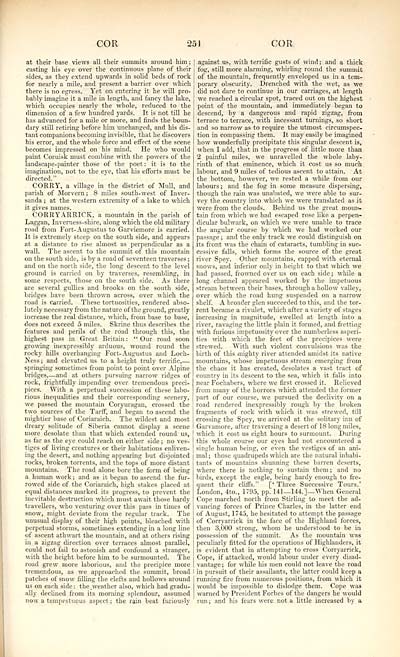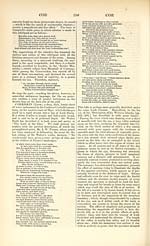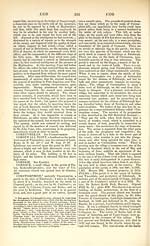Topographical, statistical, and historical gazetteer of Scotland > Volume 1
(331) Page 251
Download files
Complete book:
Individual page:
Thumbnail gallery: Grid view | List view

COR
251
COR
at their base views all their summits around him ;
casting his eye over the continuous plane of their
sides, as they extend upwards in solid beds of rock
for nearly a mile, and present a barrier over which
there is no egress. Yet on entering it he will pro-
bably imagine it a mile in length, and fancy the lake,
which occupies nearly the whole, reduced to the
dimension of a few hundred yards. It is not till he
has advanced for a mile or more, and finds the boun-
dary still retiring before him unchanged, and his dis-
tant companions becoming invisible, that he discovers
his error, and the whole force and effect of the scene
becomes impressed on his mind. He w T ho would
paint Coruisk must combine with the powers of the
landscape-painter those of the poet: it is to the
imagination, not to the eye, that his efforts must be
directed."
CORRY, a village in the district of Mull, and
parish of Morvern ; 8 miles south-west of Inver-
sanda ; at the western extremity of a lake to which
it gives names.
CORRYARRICK, a mountain in the parish of
Laggan, Inverness-shire, along which the old military
road from Fort- Augustus to Garviemore is carried.
It is extremely steep on the south side, and appears
at a distance to rise almost as perpendicular as a
wall. The ascent to the summit of this mountain
on the south side, is by a road of seventeen traverses ;
and on the north side, the long descent to the level
ground is carried on by traverses, resembling, in
some respects, those on the south side. As there
are several gullies and brooks on the south side,
bridges have been thrown across, over which the
road is carried. These tortuosities, rendered abso-
lutely necessary from the nature of the ground, greatly
increase the real distance, which, from base to base,
does not exceed 5 miles. Skrine thus describes the
features and perils of the road through this, the
highest pass in Great Britain: "Our road soon
growing inexpressibly arduous, wound round the
rocky hills overhanging Fort-Augustus and Loch-
Ness ; and elevated us to a height truly terrific, —
springing sometimes from point to point over Alpine
bridges, — and at others pursuing narrow ridges of
rock, frightfully impending over tremendous preci-
pices. With a perpetual succession of these labo-
rious inequalities and their corresponding scenery,
we passed the mountain Coryuragan, crossed the
two sources of the Tarff, and began to ascend the
mightier base of Coriaraich. The wildest and most
dreary solitude of Siberia cannot display a scene
more desolate than that which extended round us,
as far as the eye could reach on either side ; no ves-
tiges of living creatures or their- habitations enliven-
ing the desert, and nothing appearing but disjointed
rocks, broken torrents, and the tops of more distant
mountains. The road alone bore the form of being
a human work ; and as it began to ascend the fur-
rowed side of the Coriaraich, high stakes placed at
equal distances marked its progress, to prevent the
inevitable destruction which must await those hardy
travellers, who venturing over this pass in times of
snow, might deviate from the regular track. The
unusual display of their high points, bleached with
perpetual storms, sometimes extending in a long line
of ascent athwart the mountain, and at others rising
in a 2igzag direction over terraces almost parallel,
could not fail to astonish and confound a stranger,
with the height before him to be surmounted. The
road grew more laborious, and the precipice more
tremendous, as we approached the summit, broad
patches of snow rilling the clefts and hollows around
us on each side : the .weather also, which had gradu-
ally declined from its morning splendour, assumed
now a tempestuous aspect ; the rain beat furiously
against us, with terrific gusts of wind; and a thick
fog, still more alarming, whirling round the summit
of the mountain, frequently enveloped us in a tem-
porary obscurity. Drenched with the wet, as we
did not dare to continue in our carriages, at length
we reached a circular spot, traced out on the highest
point of the mountain, and immediately began to
descend, by a dangerous and rapid zigzag, from
terrace to terrace, with incessant turnings, so short
and so narrow as to require the utmost circumspec-
tion in compassing them. It may easily be imagined
how wonderfully precipitate this singular descent is,
when I add, that in the progress of little more than
2 painful miles, we unravelled the whole laby-
rinth of that eminence, which it cost us so much
labour, and 9 miles of tedious ascent to attain. At
the bottom, however, we rested a while from our
labours ; and the fog in some measure dispersing,
though the rain was unabated, we were able to sur-
vey the country into which we were translated as it
were from the clouds. Behind us the great moun-
tain from which we had escaped rose like a perpen-
dicular bulwark, on which we were unable to trace
the angular course by which we had worked our
passage ; and the only track we could distinguish on
its front was the chain of cataracts, tumbling in suc-
cessive falls, which forms the source of the great
river Spey. Other mountains, capped wdth eternal
snows, and inferior only in height to that which we
had passed, frowned over us on each side ; while a
long channel appeared worked by the impetuous
stream between their bases, through a hollow valley,
over which the road hung suspended on a narrow
shelf. A broader glen succeeded to this, and the tor-
rent became a rivulet, which after a variety of stages
increasing in magnitude, swelled at length into a
river, ravaging the little plain it formed, and fretting
with furious impetuosity over the numberless asperi-
ties with which the feet of the precipices were
strewed. With such violent convulsions was the
birth of this mighty river attended amidst its native
mountains, whose impetuous stream emerging from
the chaos it has created, desolates a vast tract of
country in its descent to the sea, which it falls into
near Fochabers, where we first crossed it. Relieved
from many of the horrors which attended the former
part of our course, we pursued the declivity on a
road rendered inexpressibly rough by the broken
fragments of rock with which it was strewed, till
crossing the Spey, we arrived at the solitary inn of
Garvamore, after traversing a desert of 18 long miles,
which it cost us eight hours to surmount. During
this whole course our eyes had not encountered a
single human being, or even the vestiges of an ani-
mal ; those quadrupeds which are the natural inhabi-
tants of mountains shunning these barren deserts,
w r here there is nothing to sustain them ; and no
birds, except the eagle, being hardy enough to fre-
quent their cliffs." [' Three Successive Tours.'
London, 4to., 1795, pp. 141 — 144.] — When General
Cope marched north from Stirling to meet the ad-
vancing forces of Prince Charles, in the latter end
of August, 1745, he hesitated to attempt the passage
of Corryarrick in the face of the Highland forces,
then 3,000 strong, whom he understood to be in
possession of the summit. As the mountain was
peculiarly fitted for the operations of Highlanders, it
is evident that in attempting to cross Corryarrick,
Cope, if attacked, would labour under every disad-
vantage; for while his men could not leave the road
I in pursuit of their assailants, the latter coidd keep a
running fire from numerous positions, from which it
would be impossible to dislodge them. Cope was
warned by President Forbes of the dangers he would
run ; and bis fears were not a little increased by a
251
COR
at their base views all their summits around him ;
casting his eye over the continuous plane of their
sides, as they extend upwards in solid beds of rock
for nearly a mile, and present a barrier over which
there is no egress. Yet on entering it he will pro-
bably imagine it a mile in length, and fancy the lake,
which occupies nearly the whole, reduced to the
dimension of a few hundred yards. It is not till he
has advanced for a mile or more, and finds the boun-
dary still retiring before him unchanged, and his dis-
tant companions becoming invisible, that he discovers
his error, and the whole force and effect of the scene
becomes impressed on his mind. He w T ho would
paint Coruisk must combine with the powers of the
landscape-painter those of the poet: it is to the
imagination, not to the eye, that his efforts must be
directed."
CORRY, a village in the district of Mull, and
parish of Morvern ; 8 miles south-west of Inver-
sanda ; at the western extremity of a lake to which
it gives names.
CORRYARRICK, a mountain in the parish of
Laggan, Inverness-shire, along which the old military
road from Fort- Augustus to Garviemore is carried.
It is extremely steep on the south side, and appears
at a distance to rise almost as perpendicular as a
wall. The ascent to the summit of this mountain
on the south side, is by a road of seventeen traverses ;
and on the north side, the long descent to the level
ground is carried on by traverses, resembling, in
some respects, those on the south side. As there
are several gullies and brooks on the south side,
bridges have been thrown across, over which the
road is carried. These tortuosities, rendered abso-
lutely necessary from the nature of the ground, greatly
increase the real distance, which, from base to base,
does not exceed 5 miles. Skrine thus describes the
features and perils of the road through this, the
highest pass in Great Britain: "Our road soon
growing inexpressibly arduous, wound round the
rocky hills overhanging Fort-Augustus and Loch-
Ness ; and elevated us to a height truly terrific, —
springing sometimes from point to point over Alpine
bridges, — and at others pursuing narrow ridges of
rock, frightfully impending over tremendous preci-
pices. With a perpetual succession of these labo-
rious inequalities and their corresponding scenery,
we passed the mountain Coryuragan, crossed the
two sources of the Tarff, and began to ascend the
mightier base of Coriaraich. The wildest and most
dreary solitude of Siberia cannot display a scene
more desolate than that which extended round us,
as far as the eye could reach on either side ; no ves-
tiges of living creatures or their- habitations enliven-
ing the desert, and nothing appearing but disjointed
rocks, broken torrents, and the tops of more distant
mountains. The road alone bore the form of being
a human work ; and as it began to ascend the fur-
rowed side of the Coriaraich, high stakes placed at
equal distances marked its progress, to prevent the
inevitable destruction which must await those hardy
travellers, who venturing over this pass in times of
snow, might deviate from the regular track. The
unusual display of their high points, bleached with
perpetual storms, sometimes extending in a long line
of ascent athwart the mountain, and at others rising
in a 2igzag direction over terraces almost parallel,
could not fail to astonish and confound a stranger,
with the height before him to be surmounted. The
road grew more laborious, and the precipice more
tremendous, as we approached the summit, broad
patches of snow rilling the clefts and hollows around
us on each side : the .weather also, which had gradu-
ally declined from its morning splendour, assumed
now a tempestuous aspect ; the rain beat furiously
against us, with terrific gusts of wind; and a thick
fog, still more alarming, whirling round the summit
of the mountain, frequently enveloped us in a tem-
porary obscurity. Drenched with the wet, as we
did not dare to continue in our carriages, at length
we reached a circular spot, traced out on the highest
point of the mountain, and immediately began to
descend, by a dangerous and rapid zigzag, from
terrace to terrace, with incessant turnings, so short
and so narrow as to require the utmost circumspec-
tion in compassing them. It may easily be imagined
how wonderfully precipitate this singular descent is,
when I add, that in the progress of little more than
2 painful miles, we unravelled the whole laby-
rinth of that eminence, which it cost us so much
labour, and 9 miles of tedious ascent to attain. At
the bottom, however, we rested a while from our
labours ; and the fog in some measure dispersing,
though the rain was unabated, we were able to sur-
vey the country into which we were translated as it
were from the clouds. Behind us the great moun-
tain from which we had escaped rose like a perpen-
dicular bulwark, on which we were unable to trace
the angular course by which we had worked our
passage ; and the only track we could distinguish on
its front was the chain of cataracts, tumbling in suc-
cessive falls, which forms the source of the great
river Spey. Other mountains, capped wdth eternal
snows, and inferior only in height to that which we
had passed, frowned over us on each side ; while a
long channel appeared worked by the impetuous
stream between their bases, through a hollow valley,
over which the road hung suspended on a narrow
shelf. A broader glen succeeded to this, and the tor-
rent became a rivulet, which after a variety of stages
increasing in magnitude, swelled at length into a
river, ravaging the little plain it formed, and fretting
with furious impetuosity over the numberless asperi-
ties with which the feet of the precipices were
strewed. With such violent convulsions was the
birth of this mighty river attended amidst its native
mountains, whose impetuous stream emerging from
the chaos it has created, desolates a vast tract of
country in its descent to the sea, which it falls into
near Fochabers, where we first crossed it. Relieved
from many of the horrors which attended the former
part of our course, we pursued the declivity on a
road rendered inexpressibly rough by the broken
fragments of rock with which it was strewed, till
crossing the Spey, we arrived at the solitary inn of
Garvamore, after traversing a desert of 18 long miles,
which it cost us eight hours to surmount. During
this whole course our eyes had not encountered a
single human being, or even the vestiges of an ani-
mal ; those quadrupeds which are the natural inhabi-
tants of mountains shunning these barren deserts,
w r here there is nothing to sustain them ; and no
birds, except the eagle, being hardy enough to fre-
quent their cliffs." [' Three Successive Tours.'
London, 4to., 1795, pp. 141 — 144.] — When General
Cope marched north from Stirling to meet the ad-
vancing forces of Prince Charles, in the latter end
of August, 1745, he hesitated to attempt the passage
of Corryarrick in the face of the Highland forces,
then 3,000 strong, whom he understood to be in
possession of the summit. As the mountain was
peculiarly fitted for the operations of Highlanders, it
is evident that in attempting to cross Corryarrick,
Cope, if attacked, would labour under every disad-
vantage; for while his men could not leave the road
I in pursuit of their assailants, the latter coidd keep a
running fire from numerous positions, from which it
would be impossible to dislodge them. Cope was
warned by President Forbes of the dangers he would
run ; and bis fears were not a little increased by a
Set display mode to: Large image | Transcription
Images and transcriptions on this page, including medium image downloads, may be used under the Creative Commons Attribution 4.0 International Licence unless otherwise stated. ![]()
| Gazetteers of Scotland, 1803-1901 > Topographical, statistical, and historical gazetteer of Scotland > Volume 1 > (331) Page 251 |
|---|
| Permanent URL | https://digital.nls.uk/97441518 |
|---|
| Description | Volume first. A-H. |
|---|---|
| Attribution and copyright: |
|

